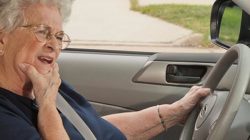
AAA Longitudinal Research on Aging Drivers (LongROAD) Data User Guide
This document serves as the data user guide for the 5-year multi-site AAA LongROAD prospective cohort study of 2,990 drivers aged 65–79 at baseline.
January 2024 Technical Report

Physical Function and Frailty Are Associated with Self-Regulation of Driving among Older Adults: A LongROAD Study
This study examined physical function and frailty, and their association with strategic driving self-regulation, using data from the AAA Longitudinal Research on Aging Drivers study.
October 2023 Research Brief

In-Vehicle Technology Use and Associated Factors Among Older Drivers
This study examines the prevalence and frequency of use of in-vehicle technologies as well as the relationships between technology-use frequency and associated factors among a subset of AAA Longitudinal Research on Aging Drivers (AAA LongROAD) participants.
January 2023 Research Brief

Advanced Driver Assistance Systems and Older Drivers: Changes in Prevalence, Use, and Perceptions Over 3 Years of the AAA LongROAD Study
This study examines changes in the prevalence of advanced driver assistance systems (ADAS) among a large sample of older drivers, as well changes in how these drivers perceived and learned to use ADAS.
December 2021 Research Brief

Objective Driving Data in the LongROAD Study: An Overview of Changes to Data Collection Procedures from a Datalogger to a Travel App
This research brief describes changes to the procedures for collection of objective driving data in the Longitudinal Research on Aging Drivers (LongROAD) Study.
September 2021 Research Brief

Identifying Policy Approaches to Extending the Safe Mobility of Older Adults
The objective of this project was to examine effective policies and practices in driver licensing of older and medically at-risk drivers and offer practical guidance to driver licensing officials and policymakers.
January 2021 Technical Report | Report Summary

Examining the Increase in Pedestrian Fatalities in the United States, 2009–2018
This research examines the increase in pedestrian fatalities from 2009 to 2018 through analysis of changes in the presence of certain pedestrian, driver, vehicle, and environmental factors.
January 2021 Research Brief

Effects of Hearing Impairment on Driving Exposure and Patterns Among a Large Cohort of Older Drivers: AAA LongROAD Study
This brief examines the effects of hearing impairment, alone and in combination with cognitive and/or visual impairment, on the driving exposure and patterns of older drivers.
December 2020 Research Brief

Older Drivers and Advanced Driver Assistance Systems
This research brief describes the efforts to address questions on driver perception of and learning methods for advanced driver assistance systems using data from AAA Longitudinal Research on Aging Drivers (AAA LongROAD) studies.
December 2020 Research Brief

A Simulator-Based Evaluation of Two Hazard Anticipation Training Programs for Novice Drivers
Young novice drivers have higher crash rates than drivers of any other age. This research examines the effects of two computer-based training programs that seek to improve inexperienced drivers’ ability to detect and respond to hazards on the road.
December 2020 Technical Report | Report Summary